Star Trek Voyager: A Warm Blanket
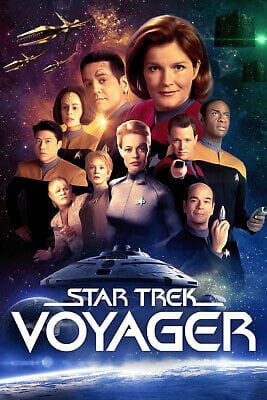
When the COVID-19 pandemic started I was living with my Cousin and decided it was time to start up some extremely long pieces of media. The first was One Piece, which I'll happily talk about for hours these days, and the other was Star Trek: The Next Generation. I had seen episodes of the show as far back as 2001 when I was still in elementary school at a friend's house, and then later as a college freshman I used TNG to bond with some floor mates. So returning to it, having made it through the first season in College, I pressed on and finished it out in a few months after moving (Yes I moved in the early months of COVID, it was unfun.) For the following year or so I ate up DS9, enjoying it slightly more than TNG yet they were neck and neck at the time. Last year, when I got laid off, my partner suggested swapping classic Trek favorites with me. They watched DS9 for me and they gave me Voyager to watch, the only 90's trek I had yet to work my way through. Through the power of watching history I can see that I started it November 27th, 2023, and finished it Sunday, June 2nd, 2024. I am not yet at 100% completion, there were some real terrible episodes in S2 that I skipped altogether, but I have now seen most of the show and want to expose my intense love for 90's trek for all to see.
Differences Between Series
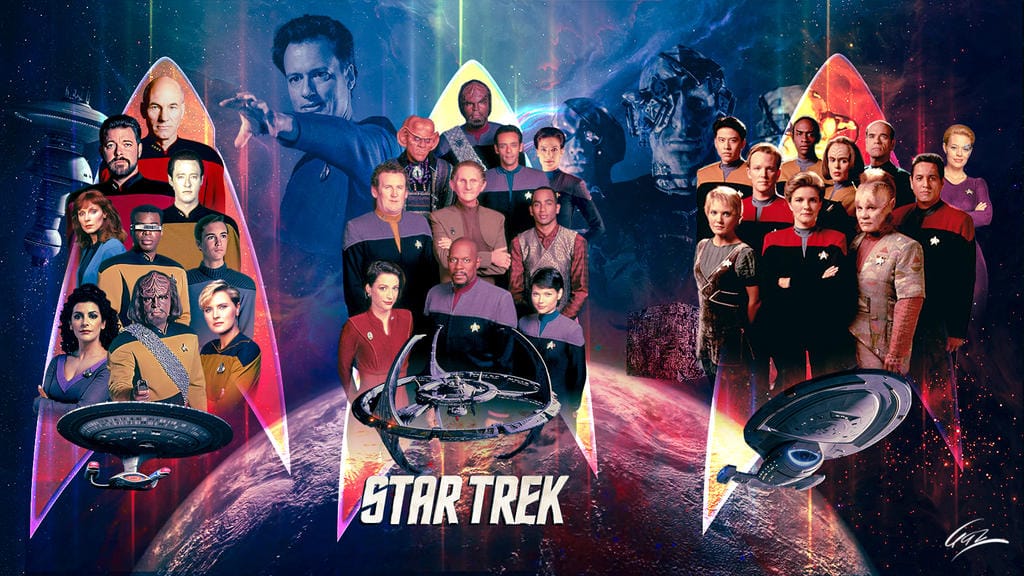
Before I focus solely Voyager, I want to reflect on the three series mentioned above: TNG, DS9, and VOY. They are all Sci-Fi series set in the same connected universe. They take place about a hundred years after the original Star Trek series, and this allows the show runners a great opportunity for worldbuilding. Yet these are episodic shows that don't keep continuity as tightly as modern television. Watching it in order is nice, since you can feel the actors get more at home with the characters and the writers can return to concepts. TNG trailblazed for television events, the summer after the Season 3 finale being cited by many fans to be a torturous summer pondering Picard's fate. DS9 trailblazed serialized television, doing much more Last time on Star Trek than any other series pre 2009. Voyager trailblazed by having more women on the cast than usual, which is extremely cynical of me now but also was a genuine revelation at the time, making the ranking command officer a woman was a huge step for the series.
Not only did each series innovate, but they each had a firm identity they defined. TNG took some time to find it's stride, but once it hits Season 3 it shows off intelligent Sci-FI that dips into a lot more topics than one would expect. Having discussions about Gender, Consent, reparations, perspective, and a thinly veiled communist inspired villain, the series understood using Sci-Fi as a lens to reflect upon the modern times. DS9 had a very diverse cast, notably Avery Brooks being the first Black captain and having many directors being people of color and the cast being very diverse. If TNG is vanilla Sci-fi, then Deep Space Nine is the darker side of the utopian future. What happens when a utopia goes to war with intergalactic eugenicists? What would a Federation CIA look like? How do other space faring cultures see the Federation? How does a commander deal with being seen as a religious figure for the local planet? DS9 doesn't back away from the harder questions to answer, which was refreshing for the 90's.
If TNG is Vanilla, and DS9 is edgier, then where does that leave VOY? I view Voyager as a very strange blend that is closer to "Sci-Fi family drama" than the premise promises. Starting the series as two separate crews being flung a distance of more than 76 years away from Earth, they have to survive in a very hostile environment to find their way home. It takes two ideologically opposed crews, puts them in close proximity for a long time, and it turns them into a sort of dysfunctional found family. They don't use the two disparate crew angle much (about 13 episodes mine this for the meat of the episode) but it really enjoys reveling in dangling the "get home" carrot in front of the crew. This leads to some really great points in their journey, like making contact with home for the first time in the show 4 years into their journey, or making each season have it's own holodeck program the crew frequents to give time a sense of progression.
I will plainly state my bias here before diving in: Deep Space Nine is my favorite Star Trek, followed by The Next Generation then Voyager. That said, They're all better than most television that I view today, and I'll miss having new old Star Trek to mine for entertainment. I used to be behind some friends in knowledge of Trek, and now I'm apparently surpassing them and BOY does that embarrass me. So, having gotten the meta stuff out of the way, I'm going to dive into this the only way I know how: Through a character analysis!
Character Analysis
Feel free to treat this order as my tier list for the characters, starting with probably my least favorite character in the show:
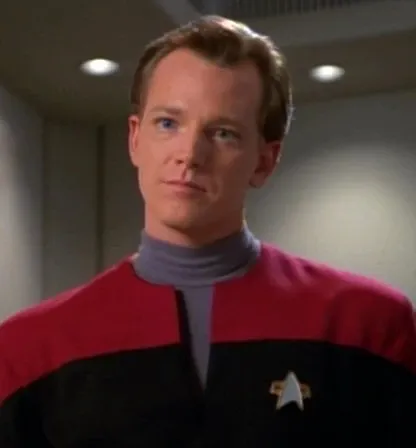
Tom Paris
I need to start with why I don't like Tom Paris: He's a way to get around paying a TNG writer. Robert Duncan McNeil played Nick Locarno in TNG, and instead of using that character for this actor they wrote a new one. This kinda pit me against him existing at the start, since they use Nick as a basis for Tom, but he really loses me when he acts as basically a cypher for the writers to nerd out about the 1950's. He hand builds hot rods in his spare time, plays in black and white Sci-fi serials, and his girlfriend gifts him a CRT television to watch cartoons on. He's a man child who winds up with a wife because he bumbles his way into dating her. There are of course good parts of Paris, his relationship with the Captain and Harry Kim really make him shine, and his constant needling of Tuvok is fun , but overall every time Paris shows up for an episode I fear the plot is 2 seconds away from turning into a "shut your brain off" episode. All this aside, I do love when they use his character to his purpose, like forcing him to take a pilot safety course in the final season. My favorite episode starring him is probably the Christine ripoff Alice, Paris getting seduced by a ship AI instead of a haunted corvette. It's widely seen as an awful episode but being a John Carpenter fan I was tickled nonetheless.
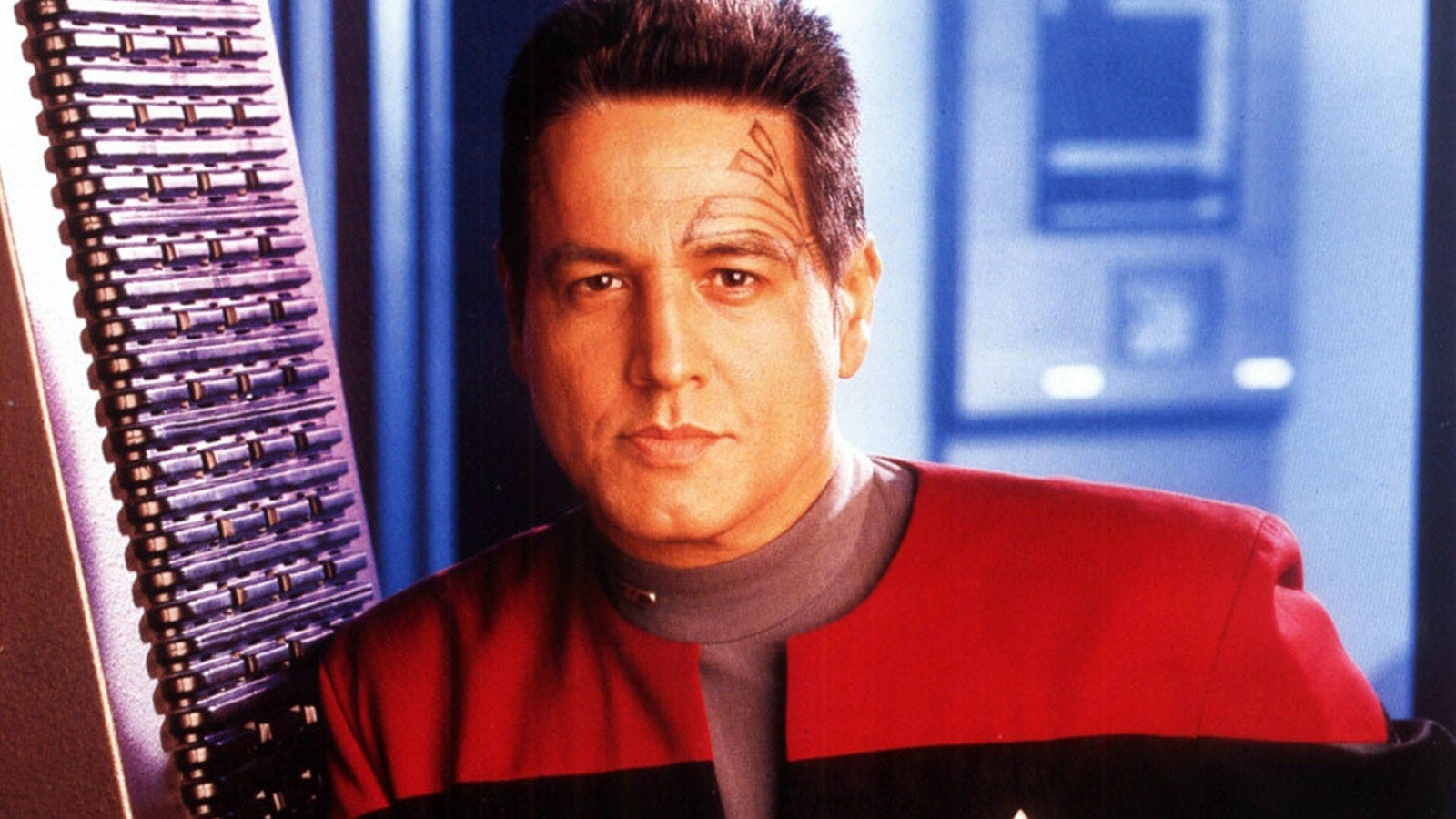
Chakotay
Chakotay is a fraught character, but one I have to give some props with being representation. There are very few native peoples represented in media, yet Robert Beltran is Hispanic, not a native person, which leads to some complicated feelings. Additionally, the consultant they had for the character wasn't actually a professional, just a grifter who said he knew about native cultures. I'm just going to chalk this up to growing pains in media because otherwise he's impossible to get past.
After all that, I can basically only say that Robert Beltran is very handsome and very sweet as Chakote. Anything deeper than that isn't really asked, being the least interesting first officer in any Star Trek series. The writers really fail Chakotay, giving him very few interesting episodes to shine in and really developing his character in strange ways. It's cool he's a vegetarian, but it's weird that he's also a boxer. He's extremely gentle and a steady presence to his shoot from his hip captain, and the two have some chemistry, yet their romance goes nowhere for the whole series. To top it all off, they force a relationship between him and Seven of Nine in the episode of the series, which I bucked against. Overall, he acts as a nice grounding stone but overall is forgettable in most of his plots. Chakote's biggest strength is his "Fire" commands, and my partner and I can't help but say "Sounds Great!" like him due to the podcast Greatest Generation Podcast. My favorite Chakote episode is Nemesis, where he's brainwashed to be a violent bigot and to "Exterminate the Nemesis!"
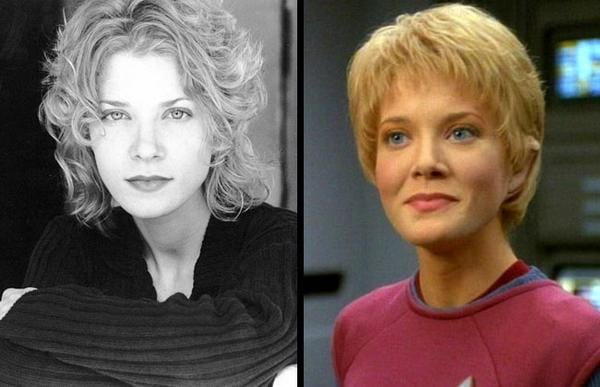
Kes
Jenifer Lien was Kes for seasons 1-3 of the series, overlapping with Seven of Nine for an episode or two before ascending to a higher form of existence. That's just kinda how it goes when you're not treated very well and have recently suffered from mental health issues. Apparently the decision was to cut her or Garret Wang, and when Wang was on People Magazine's "Hottest 50" list and that settled it.
Forcing past the sadness, Kes is put into a lot of weird situations. She's an alien who only lives for about nine years, so she ages and learns extremely fast. She brings a really interesting perspective for the crew, acting as the resident super psychic. That advanced aging is kinda gross when you consider she dates Neelix at the start of the show, having a man in his thirties date an under one year old is skeevy. All this said, she brings a really interesting non-human perspective to the crew, her relationship with Janeway and Tuvok as surrogate parents is really sweet. As with most 90's TV, female characters are under written and under appreciated when they aren't the protagonist. Warlord is Jenifer Lien's tour de force, acting against herself for control over her body while being a very interesting relationship dynamic of a man possessing an extremely powerful female body.
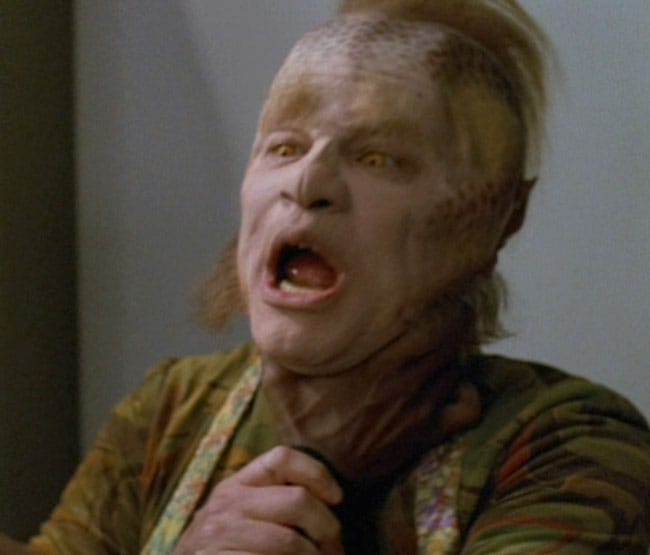
Neelix
Ethan Phillips is the "full loaf" alien for this Trek series, putting on layers of makeup every day in order to portray Neelix. I both love and hate Neelix, he's the mascot alien character of Voyager. He fills a very emotional role as the ship's ambassador and morale officer, as well as chef. Neelix starts the series as a very annoying character, causing as more problems than he solves, but evolves into a more rounded character after showing that he's capable of more than being just a bumbling oddball. I remember texting my partner "You've got to be kidding me!" when he was given the title of ambassador, and yet by his final episode on the show I teared up at his sendoff. I'd argue that Neelix is the heart of Voyager, a very weird character that turns out to be a super important catalyst for many episodes. Ethan Phillips is an incredible actor, being able to swing from clown to broken man in the same episodes sometimes. My favorite Neelix episode is Jetrel, the first time Ethan Phillips is given really heavy subject matter like dealing with a thinly veiled Hiroshima/Nagasaki story.
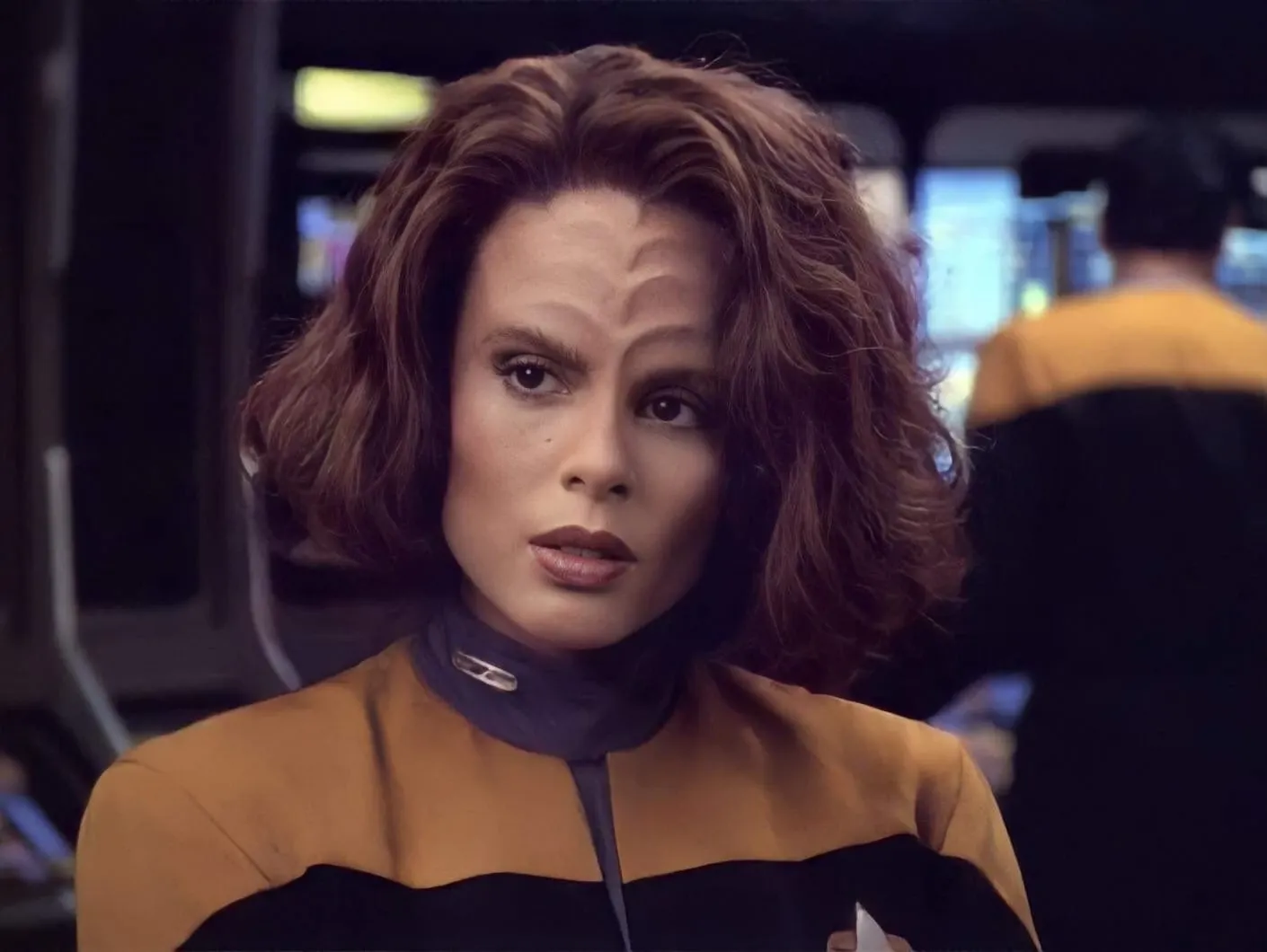
B'Elanna Torres
The only incredible lady klingon in trek, Roxann Dawson really elevates Voyager when she's given the chance. From acting to directing, she really gives a lot to the series and even through a pregnancy she does her job well. Being a female character mostly written by men, she's unusual because she's commonly the most competent person in the room. The biggest issue with early and late B'ellana is that she has a lot of internalized klingon racism from being raised on a human planet, and that's pretty hamfisted even for the time of production. The death of character for BLT (The best nickname in the series) starts with her relationship with Tom Paris. They have moderate chemistry, but are both extremely combative which makes their relationship feel a bit forced. That said, I don't know who I'd put into a relationship on this show, so I guess if any two characters had to be paired then I don't mind BLT being attached to Paris to make them both have new story avenues to explore. My favorite B'elanna episode has to be Remember, where she's forced to experience the genocide of a species of aliens to expose their past, a very rough acting challenge handled well.
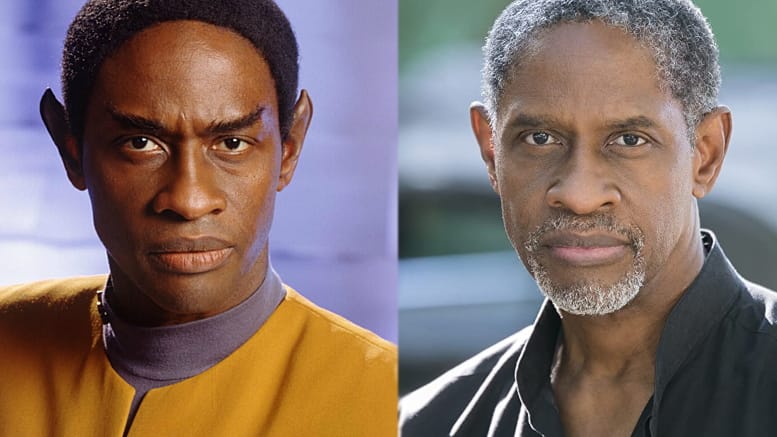
Tuvok
Vulcans and Androids are both terribly hard to depict well in Trek, but Tim Russ does a really great job with the challenge of Tuvok. He's the father figure in the family ship view, thus he's very stern and is focused on making sure the physical well being of the crew is in steady hands. That said, he lets a whole lot of deadly things near the engineering section, which is not very safe in my opinion. Vulcans in Trek have total control over their emotions, but spending time with Tuvok makes the viewer realize that controlling your emotions doesn't mean not having them. There are many episodes take Tuvok, points at him, and says, "This dude is not okay everyone!" Also, he is a great representation as a positive, healthy black masculine role model, being strong but not impervious. Tuvok and Chakotay act as the grounding commanding officers, challenging and supporting Janeway when she needs a sounding board or a harsh reality check. Alter Ego is my favorite Tuvok episode, putting him into a love triangle with a hologram and Harry Kim to really put pressure on their bonds.
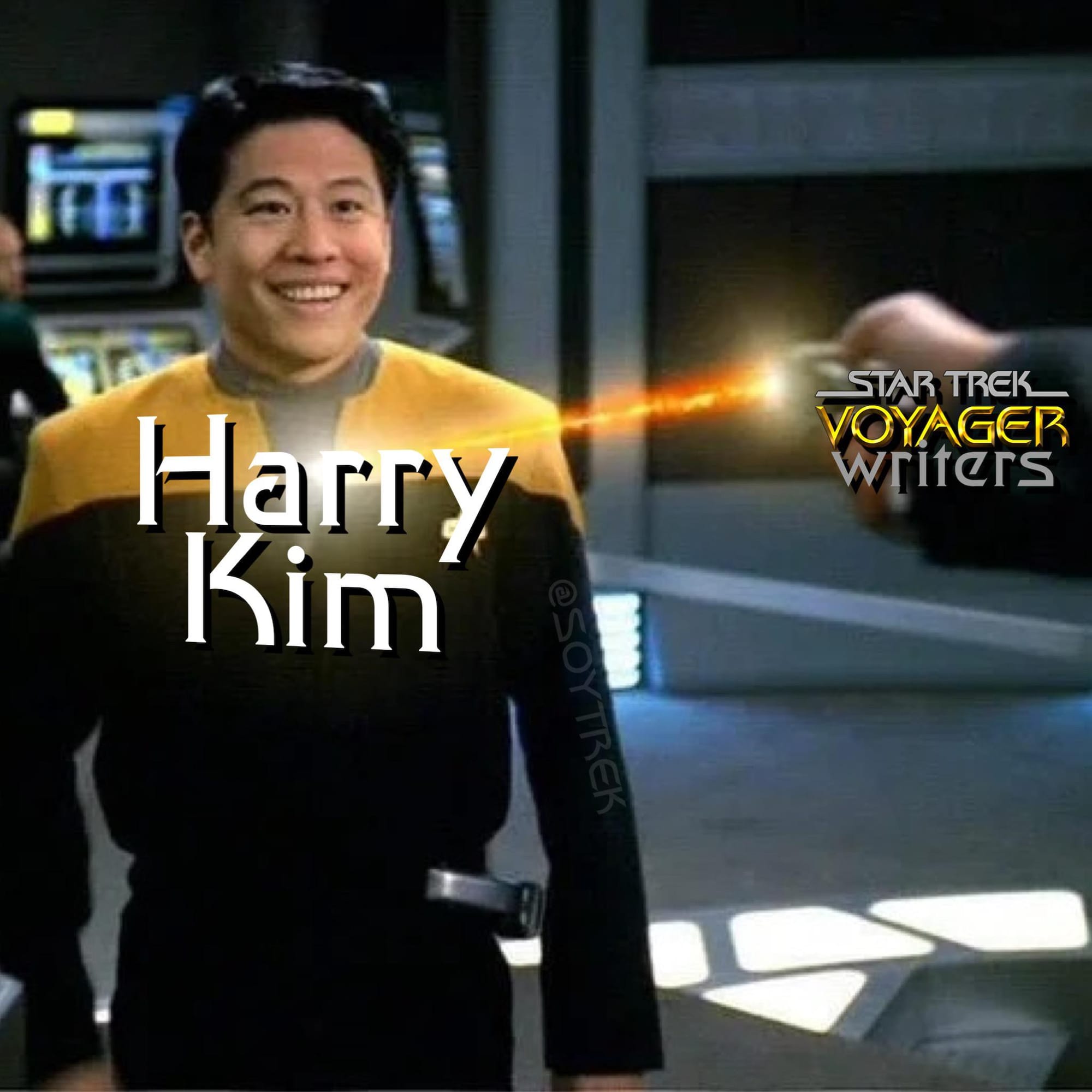
Harry Kim
Garrett Wang is doing the best he can with being given relatively little to work with. Normally I'd put him under Tuvok, but the running joke of "Harry Kim is the greatest stick-man on Voyager" truly gifted him the bonus points, thanks Greatest Generation.
Harry Kim is the character who is dunked on by the writers most, arguably on par with Chakote. Kim starts the series as a doe eyed ensign, and ends the series as the "I just want to get home" sweetie. He's usually the good guy, the every man, and that doesn't give him much to work with ever. He plays the sidekick to Paris on the Holodeck, he's always getting his heart broken across the quadrant, and when it's a Harry Kim episode he always feels like he isn't having as much fun as the other actor. I view Kim as the "Nexus of Suffering" character of Voyager, filling Miles O'Brien's very large, very Irish shoes. Every time he's in an episode, he's usually used to increase the stakes by doing psychological or physical harm to him. In honor of this, my best Harry episode is Deadlock, where they murder Harry Kim and bring in a copy of him from another reality, alongside Naomi Wildman, the youngest member of the Voyager crew.
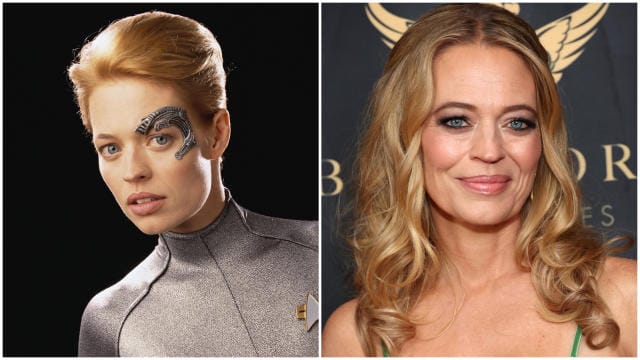
Seven of Nine
Jeri Ryan is probably the best technical actor on this series, which isn't a dunk on any other actor listed here. She does some seriously funny and dramatic acting, but is also an android/vulcan like character, being an ex-borg. This means, much like Brent Spiner as Data, that she doesn't get many chances to go big, but succeeds when she does. She is given a lot of screen time, mostly due to being the most interesting and most gorgeous person on the crew, as well as needing to catch up to the other main cast members. There are some real stinker moments where they exploit Jerri Ryan, like when she's forced into catsuits or to be nude in some scenes, but that's 90's television for you. She's jammed into many romantic plots, which some may view as annoying but I viewed it more of a person who was stripped of their humanity trying to assert control over that part of her. She is outside the normal power structures of the ship, mostly due to her sheer hyper-competence, which makes her dance with humanity so interesting. Her relationship to Janeway is really interesting too, since Kate Mulgrew didn't like the new female lead being added to her show. Despite that, their onscreen chemistry is electric and they really have great tension when their viewpoints don't align. My personal favorite Seven of Nine episode is Tsunkatse, where she gets to fight The Rock (back when he was a wrestler) in a cage match, the most 90's thing I've ever seen. Bliss is a close second, but that's more of a generally loved episode by me.
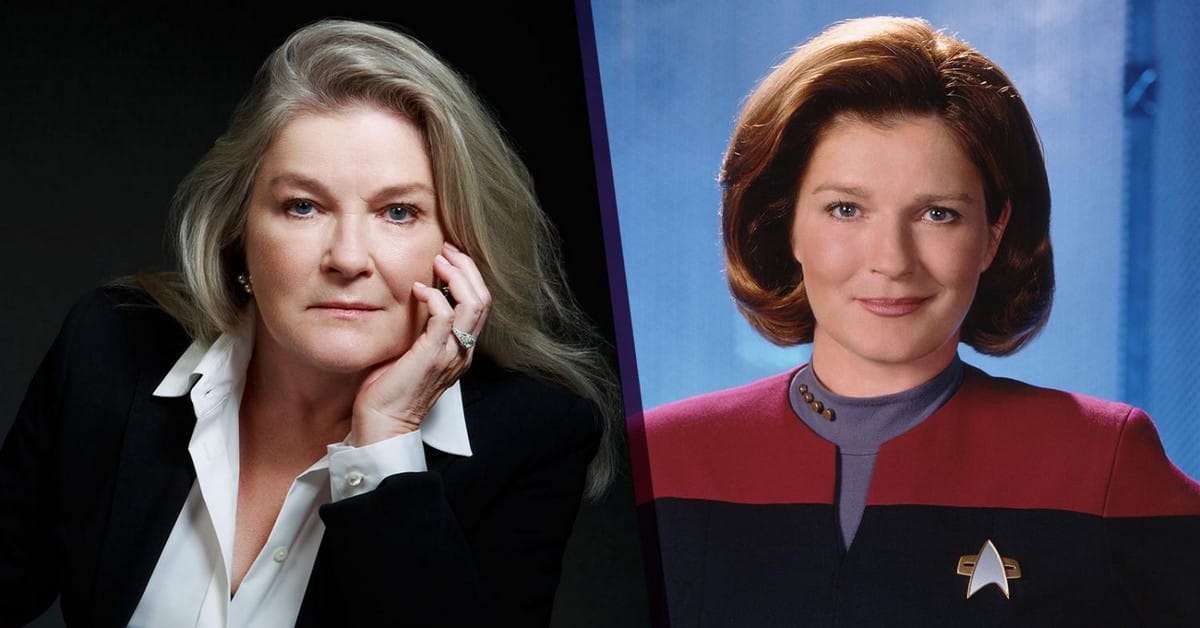
Captain Kathryn Janeway
I ended the series saying "Wow, Kate Mulgrew plays the most brutal Starfleet captain." I find that out of all the Star Trek Captains, Janeway is the best at walking the line between Kirk and Picard. She's chaotic at times, shooting from the hip and making decisions that prioritize the safety of her crew, even if it's not always the best choice. She prefers peace, but will stoically lead when violence is called for. She sets herself apart from other captains by coming up through the science track before command, which makes her a very hands-on problem solver when the issues requires intelligent solutions. And yet she is weirdly brutal with decisions she makes, from stranding her people far from home to save a planet to breaking down Tuvix into Tuvok and Neelix (Justice for Tuvix by the way.) She loses people, she utilizes people and uplifts them to do better, and overall is a fascinating captain. Her character is much more stable than the other crew members, mostly due to us not getting to see too far beyond her shields. I'm glad that I got to spend so much time with Captain Janeway, which I have similar sentiments about Picard and Sisco, each a pleasure in their own way. One of my favorite Janeway focused episodes is Resistance, where a beggar thinks she's his daughter, and she has to navigate a fascistic society with him.
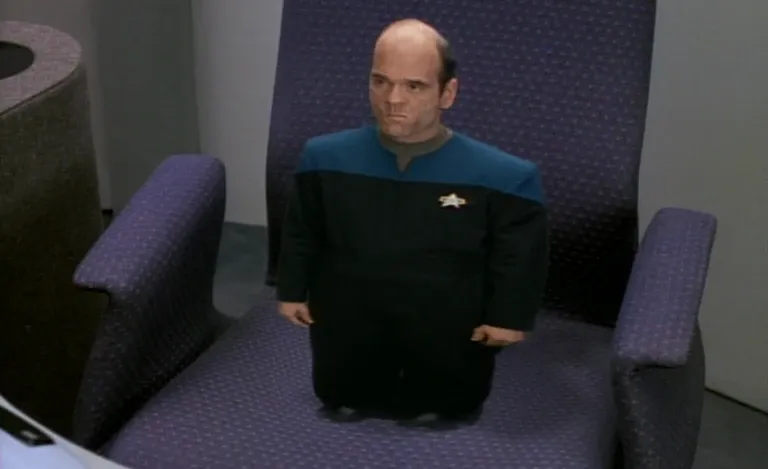
The Doctor
Robert Picardo is one of my favorite "That Guy" B actors, providing great weirdo energy in exactly the right dosage. With over 250 credits on various television shows, movies, voice casts, and more, Robert Picardo will do any work you give him. The Doctor, who is searching for a name throughout the entire series, is another run at the Data character, only less tangible. Early seasons deal with the Emergency Medical Hologram being a base version, something that was mass produced and is now gaining some amount of individuality. By the time Season 4 rolls around he switches to help Seven of Nine deal with her burgeoning humanity, acting as her mentor in the ways of human behavior. By the last season, he's fully arguing for holographic rights, treating Holograms as a type of artificial lifeform. He provides levity in some episodes while being extremely competent in others, one of my favorites being him assisting Brad Dourif retake the ship from the best Voyager villain Ceska. Now, the Doctor has some flaws, such as being a creep at times and forming unusual relationships with many crewman. I always smile when I see it's a Doctor episode though, because I always know it's going to be weird. Nothing Human is my favorite Doctor episode, calling on the holographic database to make a real Joseph Mengele type Cardassian to help BLT remove a body sized parasite.
Trek and Characters
The reason I dove into each character is because for me, Star Trek does some of the best character writing in the world of television. There is a large rotating cast of characters, put into a society that doesn't have them deal with many everyday problems of the 21st century, like food or housing, and instead you just get to spend time with them. Watching the cast grow in their acting ability, as well as their ability to adapt to weird situations, is the main reason for my love of the series. I disliked many Voyager characters at the start, but over time they slowly blossomed into some great fake friends. Sure, they don't reach the levels of other series, like Sisco, Kira, Data, or Riker, but they are still really fleshed out. I will also say that Voyager has the hottest cast as far as Star Trek goes. Sometimes it's nice just to turn your brain off and look at the pretty people in the television deal with totally alien issues. It's pure escapism, but also engages you enough to either rile against the bad or praise the good.
I am firmly in the "bad episodes can still be fun episodes" camp, and with that outlook there are many Voyager episodes I look back on fondly for goofy effects or fun performances. Seeing the mentor character in Better Call Saul show up as a nightmare clown is fun! Having the ship get infected with giant, human sized viruses is fun! I believe every show can be enjoyed, you just need to understand the perspective of the artists. Modern Marvel shows are basically an endurance test, a "How much can we ask people to invest in us before we have to make something unique?" point of view. Star Trek for me is best viewed as a sort of elevated stage play, where you form parasocial relationships to the characters and let them into your home for a short time every day. During and after COVID, I lead a very infrequent social interaction sort of life. Between working from home, social distancing, a layoff, and many moves, most of my socializing is done online. I mention all this to state that Star Trek has been a part of my social structure for a while now. Being able to talk about it with my brother, my partner, my friends, has spawned many enjoyable conversations and I've even gotten some folks to go back and watch TNG with my enthusiastic assurance that it's good television. Not every single episode of Star Trek is good, in fact many episodes fall below my normal quality assurance, but there are so many secondary enjoyments to Star Trek that really help pull up my respect for it.
I also want to reflect on some of the great villains and worldbuilding that happens in Voyager. Ceska is a fun camp villain for the first two seasons of the show, and she is given the Denise Crosby treatment for Voyager, returning the actor to the show every now and then because she's just so fun. The Hirogen, introduced in the second half of the series, are basically Predators, which is a fun new type of hunter threat that doesn't appear often in Trek. The potato looking Overlookers are one of my favorite dumb aliens, looking pretty close to Doctor who's Sontaran if they were pencil pushers instead of fighters. The Kazon are Voyager's first nemesis, a warlike people who are more or less space pirates, and they provide a lot of the texture of the early seasons. I really adore the villains here, giving each part of the series an extra layer of texture that we lack in modern television. I'm going to shift my focus away from characters for now, but understand that even if it's not quite hitting the highs of its sibling series, Voyager deserves just as much respect in the weirdness department.
Sci-Fi and Mirrors
It is my belief that Genre helps us put a small buffer in between reality and the idea that the author is trying to convey. Science Fiction is an excellent tool for the dreamers of the world, showing us a potential future that could exist, while also explaining we should strive towards or away from that future. Star Trek has always been a place to criticize and discuss culture, all the way back to the Original Series and the interracial kiss viewed across America. It's also been a place to show us what humanity could be, a place where everyone is on equal footing and we all work together to achieve greatness. There are no single individual who has higher values, aside from being more skilled and earning their position on the crew with their merit. Everyone in the show has worked hard to be there, and that makes them the best at what they do. What's better than watching a bunch of competent people struggle against long odds? That's always been the glue that makes Star Trek, well, Star Trek. Starfleet is a goal we should strive for, be it aspirationally or applied to our world of today.
So, what are the messages that the writers of Voyager looking to interact with, to put a veneer over and give people a glimpse into? One where gender has less relevance than the mind within the body. Janeway became a captain through her discipline and hard work, her femininity an aspect to her but not the thing that defines her. She has respectful, platonic relationships with Tuvok and Chakote, as well as a mentor relationship to most of the crew. Tuvok is a dignified, intelligent black character who can be saved by a young girl because she's a powerful psychic, and he doesn't feel dismissive to her, instead he wants to nurture her. The show has many great examples of positive masculinity, letting many of the male characters discuss feelings with each other without ridicule and letting them have their moments of weakness. The women are allowed to have desires, wants, and assert their right to autonomy over their bodies. There are times where the current times thoughts leak into the show, like putting Seven of Nine in a tight Catsuit to be ogled, or putting Harry Kim into adult situations more often than other characters. This grounds us, making us recall that this is in fact a show made in 1990's America, reflecting the beliefs of the culture while challenging other parts of it.
Back to the topic of plot, I would say that Voyager focuses on two major anomalies types: Time episodes and "Interpersonal" episodes. Voyager's time focus is shown mainly through the invention of "The Temporal Prime Directive," which puts a gag order on discussing time travel mechanics because that would limit the writers. Said writers implemented a work around because they wanted to be able to mine the past and the future of the crew for episodes, a decision I respect. They have these huge concepts of time travel, like the Year of Hell two parter and the finale, Endgame. Both rely on not having set in stone time travel rules, instead relying on emotional logic for both episodes. There are episodes that not only involve time travel, but also alternate timelines. Splitting the ship between realities, creating zero-time zones, making the ship exist across time, and even a planet that has time accelerated, Voyager's few days in orbit spanning the rise of a civilization. The show runners really take their time with these ideas, never running out of temporal plots all the way to the last episode.
As for the "Interpersonal" episodes, they usually surround a character being offset in some manner and the rest of the crew has to rally around them to return the status quo. Tuvok usually has a lapse into emotion, like in Meld where he links himself to a psychopath (played by Brad Dourif) in order to stabilize his mind, which leads to Tuvok gaining homicidal urges. The crew works together to return him to his Vulcan baseline, but he grows from the experience. These are where most of the crew romance happen, like in The Disease where Harry Kim gets into a physical relationship with an alien without The Doctor's permission, which leads to him getting a space STI. This may seem like a silly plot, but it leads to Harry standing by his needs for intimacy as well as The Doctor handling the situation with some respect. This culminates with Janeway needing to recognize Harry Kim as more than just the peppy ensign she knew in season one, accepting the passage of time. When you're stranded away from home, those who surround you are all you have, and putting pressure on these relationships is a really great vat of ideas to draw from when looking for a plot.
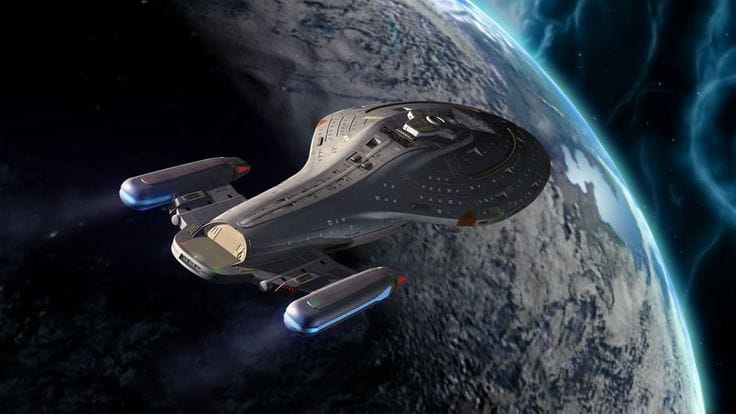
These two major wells being drawn from give the series of Voyager an interesting structure. The USS Voyager seems to be mostly self sufficient, which I was hoping there would be more logistical episodes, like "We're out of X and landed on Y to get some," happens very infrequently. Being written in the late 90's, there seems to be an "end of history" sort of mood to the show. Life happens, it uncurls slowly while the show progresses, people enter and leave the story, and yet the progress is rarely shown. New seasons are set closer to earth and thus no longer near the aliens we've interacted with thus far. The show is very episodic, status quo changes usually don't stick and when they do they aren't often called back to. This means when an episode drastically changes a character, it's usually a safe bet that they'll be fine by the end of the episode. Characters change slightly over the show, but they never drift far from their initial concept, they just become more fleshed out. Speaking of flesh...
The Borg(s)
I have quite a bit to say about The Borg. Introduced in TNG, they only show up for 6 episodes and act as an existential threat for The Federation, wiping out millions of lives and causing massive destruction. The only words we hear from them in their introduction are: "We are the Borg. We will add your Biological and Technological distinctiveness to our own. Your culture will adapt to service us. Resistance is Futile." They hail from the Delta Quadrant, where Voyager is flung to, and they are a major part of it appearing in 23 episodes. The terror of The Borg is their overwhelming power and one minded nature, being a hive mind and assimilating alien species acting as platforms for The Borg to use as they will. They don't have an individuality, and honestly act as an in-universe stand-in for the USSR if The Federation is The United States analog. The federation stands for cooperation and peace, whereas The Borg forcefully unify all under it. After the Cold War ended, the Borg needed to adapt, and Voyager really runs with the concept.
The problem with monsters is that the terror they impact us with is based on the unknown. The less we understand about a scary monster, the more terror they instill in us. The inverse is therefore true, spending time with the unknown makes it more known, which leads to understanding. The Borg in Voyager are truly reintroduced in Unity, and with it the concept of an ex-Borg. Unity is about a group of former Borg drones that were disconnected from The Collective, and by the end of the episode they form a new, kinder collective. After that is the two parter Scorpion, where the Voyager crew have to ally with The Borg in order to defeat an even more terrifying threat in Species 8472. This is followed by The Gift, where Seven of Nine joins the crew in place of Kes, thus making the Borg a part of the Voyager family. After that, four Borg children are added to the crew, which adds to our understanding of the Borg further.
At this point, the Borg have shifted from a galactic corruption, consuming all in its path, to a natural disaster, like an earthquake or tsunami. There are ways to get around the Borg, and if you understand how they work, then you prepare to deal with them. This image further gets complicated by the introduction of The Borg Queen.
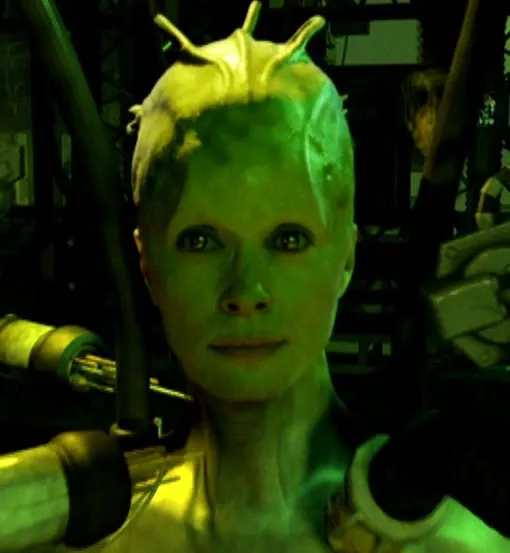
The Borg Queen was introduced in Star Trek: First Contact, the second film based on The Next Generation. She is then in four episodes of Voyager: Dark Frontier, both Unimatrix Zero parts, and the finale Endgame. Two different actors portray her, and both do a spectacular job. The problem here is that the Borg are a single cohesive identity, you're assimilated into the collective and all individuality is repressed. If that's the case, why do the Borg have a queen? Why are they lead by a single entity, instead of guiding principals or consensus? I believe that it's because they wanted a sexy movie monster, someone to tempt Data into joining the Borg. She's supposed to be a sort of queen bee, something to bring order to the chaos that is the Borg. Instead of being a progression of ideas, she acts as a completely new direction for the Borg to grow in, and I don't agree with that direction. In the finale of Voyager, a single federation vessel destroys a massive intergalactic transport hub with a few missiles, and the Borg Queen is destroyed by a single person, the final nail in the coffin for them being a terrifying threat. They try to argue that the Borg Queen is lonely, the only individual in the sea of the collective, to which my counterargument is "Simply be a part of the collective then!" From now on I can only see the Borg as a toy taken out and played with far too many times, becoming the punchline of Star Trek villains like in the Lower Decks episode "I, Excretus."
Episodes of Note
I just want to put some of my favorite single episodes, the episodes I totally skipped, and the episodes that really are the core of Voyager for me. I'll start with...
The Good
So, you've read a few thousand words and want to give Voyager a try, where to start apart from S1E1? I mean that is honestly a solid episode and should always be viewed first just to understand the starting point of every cast member. But once that is done, my favorites are:
Projections S2E3
This is one of the first interesting Doctor episodes, where he is faced with an identity crisis: Does he believe that he's the Doctor, or is he actually his creator, Zimmerman? It's an episode that really makes you feel like you're losing your grasp on reality along with The Doctor.
Tuvix S2E24
I think that this episode is one of the weirder pieces of Sci-Fi. It focuses on a transporter accident that combines Tuvok and Neelix into Tuvix, a character who is the best of his two constituent parts. The crew have to decide if the life of Tuvix is worth never getting Tuvok or Neelix back, and if it's morally okay to separate them if that kills Tuvix.
Bliss S5E14
This is basically "What if space angler fish, where the light was the character's hopes?" This is a slightly continuity based episode, but also has most of the crew out of commission. The three crew people who are up are The Doctor, Seven of Nine, and Naomi Wildman, which is a great trio to encounter an Ahab type. This was probably the high point of the series for me, but that's more of a personal opinion than a general consensus.
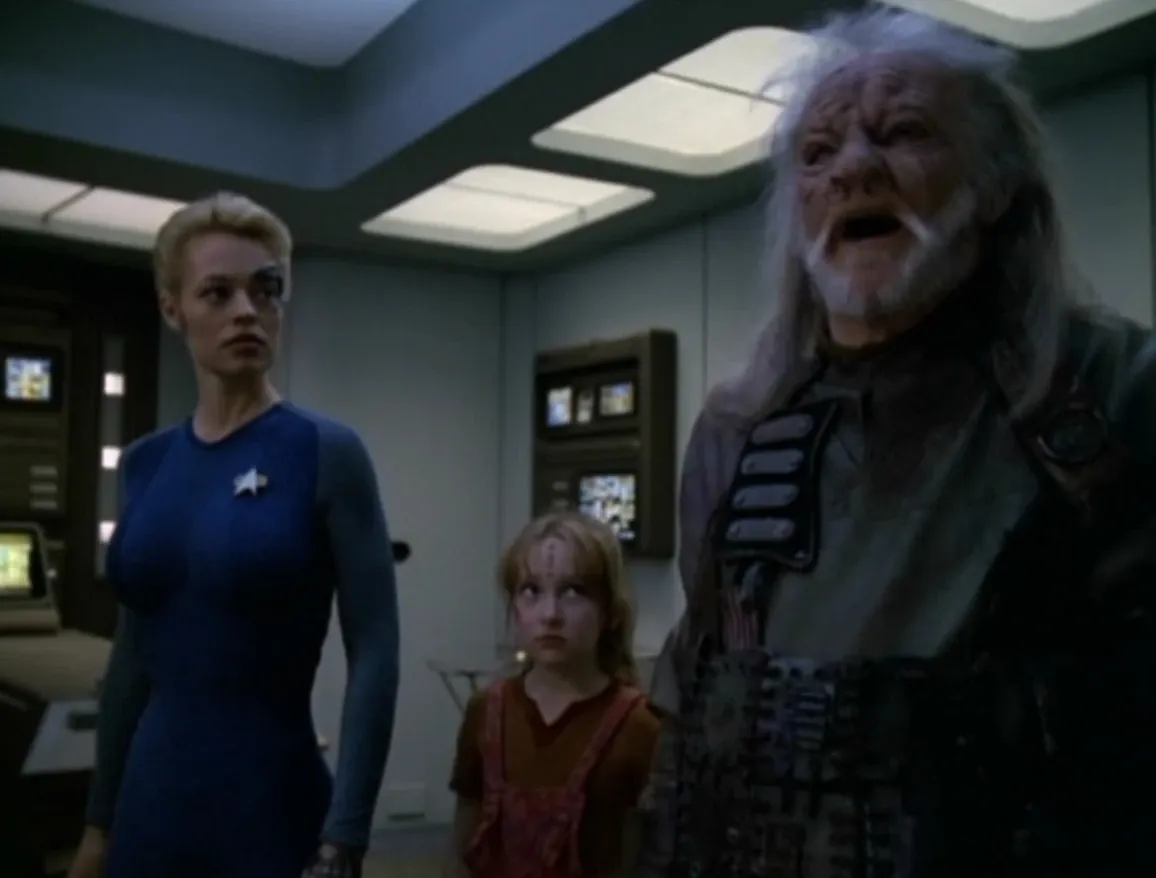
The Bad
The four episodes that I straight up skipped on my first viewing are two that are just awful, and two that are not great.
Elogium S2E4 and Tattoo S2E9
Elogium is where Kes goes into heat at the age of 2. No thanks. Tattoo is an episode that deep dives on Chakote's history with his native people, which is very poorly researched AND written.
Heroes and Demons S1E12 and Partuition S2E7
Heroes and Demons is just "What if the Doctor was in Beowulf?" and Partuition is "Paris and Neelix care for a baby" which I was just not interested in at all.
Now, what are the worst episodes that I watched? I will say that Threshold is usually sold as a the worst Voyager episode, but I thought it was at least trying something, as well as giving Paris some actual fun acting to do. The only other stinkers are either unmemorable or just retreads of TNG scripts. Like Ex Post Facto is more or less A Matter of Perspective, which are both Rashamon type episodes. I'm not going to spend much more on the bad, because Voyager has enough haters on the internet for me to add my voice to them fully.
The Core
These are the episodes when someone asks "Tell me, what's a Voyager episode like?" I can just point to this list and say "These are the ones that are distinctively Voyager"
Blood Fever S3E16
The start of the BLT and Paris romance, this episode is a Vulcan biology lesson on how they reproduce. I really enjoyed the look behind the curtain of Vulcans while as forcing characters into heightened states, as well as fleshing out some side characters along the way. This is one of those episodes that many say is a bad one, but there is something about it that sticks in my mind when I think Voyager.
Unimatrix Zero (S6 finale + S7E1)
This episode is about a rebellion forming in the Borg ranks, and the Borg Queen is pretty upset about that. I view this as Voyager's response to TNG's The Best of Both Worlds, ending on a cliffhanger for the summer to drum up attention. I'm trying to not spoil these episodes, so you'll just have to take my word that my partner was super excited when I told them my next episode was Unimatrix Zero, which made a small feedback loop of joy.
Tsunkatse (S6E15)
The famed "The Rock" episode, this is the weird crossover between Star Trek and the world of wrestling. This is also the only episode of Voyager that has Jeffery Combs, a king amongst Star Trek "That Guys." This episode is a bit of a mess, but in a good way, sort of how wrestling is!
It's been a long road
The reason for this article existing is mostly for me to gush about Star Trek, but it's also a good opportunity to discuss what I find makes good television. Every person has their own answer to good TV, be it something to talk about at the water cooler, to something that engages one's emotions, or just something to do while eating dinner. For me, a good television show is one that makes me think, one that makes me engaged and an active participant while watching. I mostly watch animation due to the vast skill required they tend to be a bit more refined, although most people just brush them off as children's media. Star Trek also gets that label occasionally, many fans starting in their youth and sticking with the series into their adulthood. No matter the series, the production put their best efforts into the show and made something to spark imagination and gives perspective.
Moving forward, I have attempted to watch Star Trek: Enterprise but it's a bit too rough, even for me. I'll go back to the well of Star Trek soon, but it needs some time of laying dormant. Heading into the summer, I'll be checking in on some returning series, like House of the Dragon and My Adventures with Superman, as well as getting ready to dive into Buffy: The Vampire Slayer for the first time as a cohesive series. Buffy is something I've watched with my family on occasion, but never sat down to watch the full series. I'm planning on making every other monday my release schedule from now on, so I'll see you back here in two weeks to delight you with my newest hyperfixation.